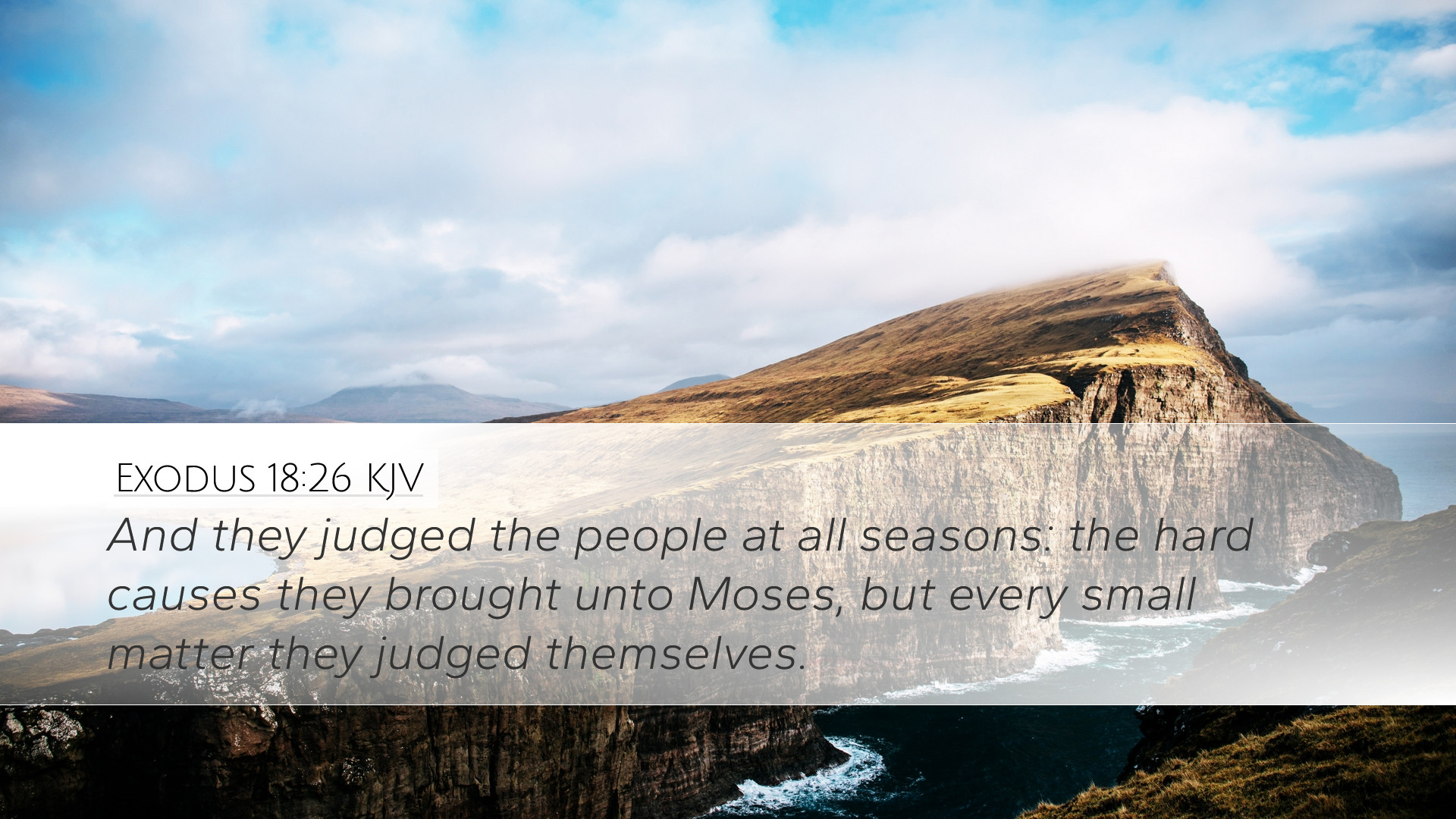Commentary on Exodus 18:26
Bible Verse: "And they judged the people at all seasons: the hard causes they brought unto Moses, but every small matter they judged themselves." - Exodus 18:26
Introduction
This verse occurs in the context of Jethro's wise counsel to Moses, highlighting the importance of delegation in leadership. Moses, overwhelmed with the task of judging the people alone, receives guidance to empower others in governance. This commentary synthesizes insights from notable public domain commentators to explore theological implications and practical applications of this verse.
The Divine Order of Judging
Matthew Henry emphasizes the necessity of proper governance within the community. He notes that the institution of judges is not merely administrative; it reflects God’s ordered creation and the need for justice. In the grand scheme of spiritual leadership, Moses represents Christ, while the appointed judges symbolize the ordained ministers who assist in the work of the Kingdom.
Albert Barnes indicates the importance of distinguishing between different kinds of disputes. He points out that while Moses handled the more complex cases, the judges managed simpler matters. This indicates a hierarchy in judicial responsibility that reflects the structure of leadership intended by God. Each individual contributes to the community's wellbeing by supporting one another, suggesting that all believers have a role to play within the Church.
The Role of Delegation
Adam Clarke elaborates on the principle of delegation as essential for effective leadership. He argues that Moses’ reluctance to delegate work led to inefficiency and potential burnout. Here, Clarke’s commentary sheds light on the significance of empowering others, which promotes collaboration and reinforces community bonds. Those who are appointed as leaders in various capacities should not only be capable rulers but also shepherds caring for their flock.
This concept resonates with pastoral care, where a shepherd must share the ministry workload to sustain health within the body of Christ. Through delegation, spiritual gifts can be utilized effectively, leading to a more vibrant and functional Church community.
Spiritual Significance
From a theological perspective, Matthew Henry connects this delegation of judgment to the priesthood of all believers. Each follower of Christ is called to function in a role that contributes to the spiritual edification of the Church. This notion signifies that leadership is not limited to a solitary figure but shared among many who are all anointed by the Spirit.
Albert Barnes argues that this reflects God's desire for a representative governance structure where leaders are accountable to those they serve. Such accountability not only upholds justice but also ensures that the leaders remain grounded in humility and service.
Practical Applications for Leaders
- Recognizing Limits: Leaders must acknowledge their limitations. In any ministry or organizational setting, understanding personal boundaries can prevent burnout, ensuring longevity in service.
- Utilizing Gifts: Leaders should encourage the use of spiritual gifts among their members. Engaging others not only lightens the burden of leadership but enriches the community with diverse contributions.
- Establishing Structure: Implementing a structured approach to ministry can foster a healthier, more responsive community. Clare’s insights underscore the importance of this systematic delegation.
- Promoting Teamwork: Effective ministry thrives on collaboration. Encouraging a culture of teamwork enhances mutual support and strengthens relationships within the Church.
Conclusion
Ultimately, Exodus 18:26 serves as a profound reminder for spiritual leaders on the necessity of delegating responsibilities. The wisdom imparted by Jethro to Moses not only speaks to the practical aspects of effective leadership but also echoes deep theological truths about community and shared governance in God’s Kingdom. Understanding and applying the principles of delegation can transform ministries, empower individuals, and enrich congregations.
As pastors, students, theologians, and scholars reflect on this scripture alongside the insights provided by the notable commentators, they are encouraged to engage with these timeless lessons, applying them to contemporary challenges within the Church today.


